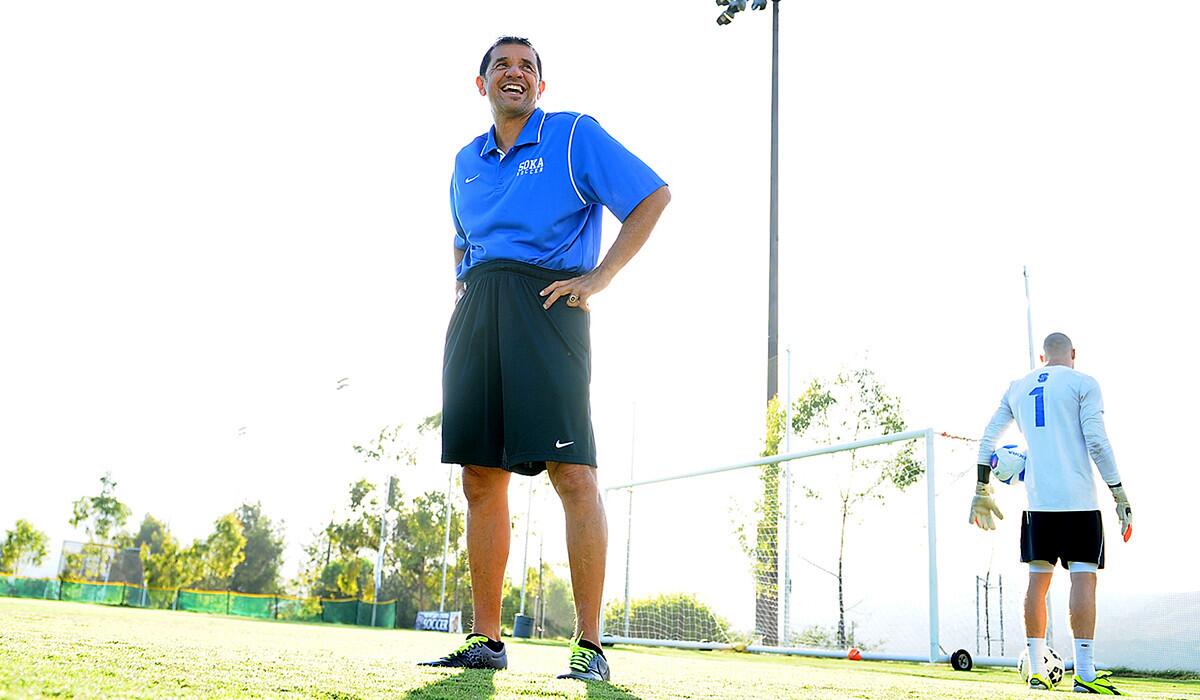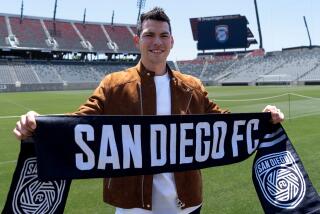Remembering AYSO’s humble beginnings in Torrance

- Share via
AYSO was born 50 years ago this fall, in a little garage on Talisman Street in Torrance, in one of those “The Wonder Years” neighborhoods where the dads all arrived home at 5 p.m. and the houses were so close you could smell if someone’s mom had just baked a pie.
Registration fee? Five bucks (now it’s $150 and up). If a player came to sign up and dad had a foreign accent, they recruited the old man to ref.
In the first couple of years, there were no age groups, so the 8-year-olds played on the same teams as the 12-year-olds. Territorial to a fault, baseball coaches kept backing up cars and pulling down the wooden soccer goals. One of the soccer dads solved it by ordering three truckloads of oil field pipe. The first time one of the goons tried to pull down a steel goal, the engine dropped right out of the butt end of his VW.
Like Jim Rome and Jose Canseco, AYSO was born in 1964, when Southern California was bursting with foreign-born engineers who came to work in aerospace. They pooled their knowledge of the game, obsessive skill sets and love for their kids into a grass-roots movement to bring soccer to America.
Hans Stierle, a graphic artist from Germany, designed the first league logo.
“My mom cleaned all the team uniforms,” recalls Stierle’s son, Paul, who played on one of the original four Torrance teams. “She’s the one who brought the very first orange slices.”
Soccer moms. Orange slices. Trophies no matter what. All that was born a half century ago this fall in Torrance, when AYSO’s pioneers insisted: “If you do not let everyone play, you will ruin the program.”
To this day, it is America’s most enlightened sports league. Sure, AYSO should probably bite the bullet and hire referees rather than rely on parental volunteers. But AYSO is not every other youth league. Fifty years later, it remains the gold standard.
How much influence has it had? Without AYSO, there would be no Mia Hamm, Brandi Chastain, Landon Donovan, all of whom got their start there. Derek Jeter played AYSO. So did my own kids. And probably yours too.
Some of our fondest memories are fall Saturdays with the Blue Dolphins or Green Slime. I can’t even manage to throw my kids’ worthless plastic trophies away. They reside in the basement, with high school yearbooks and toy trains. Worthless? To anyone but me.
Yep, 50 years later it’s almost impossible to picture America without AYSO on a Saturday morning, when half a million children trot out on the fields in their Day-Glo uniforms.
“There was so much prejudice against soccer when it started,” recalls one of the league’s first players, Joe Bonchonsky Jr., whose dad ordered the oil field pipe.
“We were like strangers in our own land,” recalls Kurt Stierle, younger son of Hans Stierle. “We were the only American kids playing soccer.”
“We were called everything from communists, to Nazis … for playing soccer,” says his brother Paul.
Yep, even the Wonder Years had a nasty edge. But soccer’s founding fathers persevered. The league’s first president, Hans Stierle, was vital in those early days, as were Joe Bonchonsky Sr., Bill Hughes and AYSO’s first coach, Scotty Kay.
It was a humbling start. Looking to stir interest, Stierle would walk across the street to Jefferson Elementary (now a middle school) and juggle a polka-dot soccer ball, trying to entice the neighborhood kids to try this new pastime.
In the fall of 1964, the dads organized the league. In that inaugural season, there were nine teams — four in Torrance and five in Culver City. One kid showed up to the first practice in metal baseball cleats.
In the very first game a few months later, the Hornets beat the Bullfrogs, 4-1. Former UCLA and Galaxy coach Sigi Schmid, now coach of the Seattle Sounders, played fullback on one of the first Torrance teams, the Firefighters.
Another Southern California coaching fixture, Marine Cano, also got his start that inaugural season.
“I was 9 or so, a shy little runt with asthma,” remembers Cano, now men’s soccer coach at Soka University. “One day our goalkeeper didn’t show up and they put me in and I made a diving catch. The rest is history.”
For Cano, it was the start toward a long career coaching college soccer and running youth camps across Southern California. To this day, he still trains AYSO players.
“I love AYSO because it gives kids their start,” Cano explains.
“Soccer is the best vehicle for teaching kids about life,” he says.
And he’s still got that first trophy too — worthless to anyone but him.
Twitter: @erskinetimes







